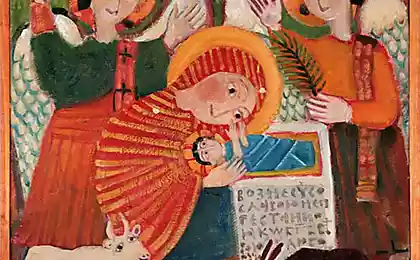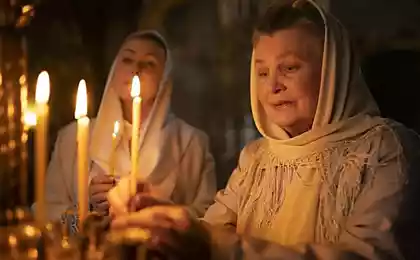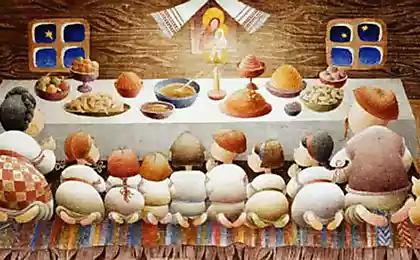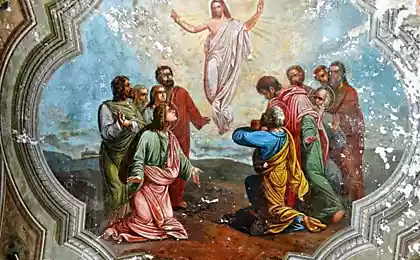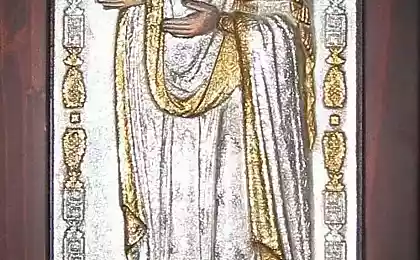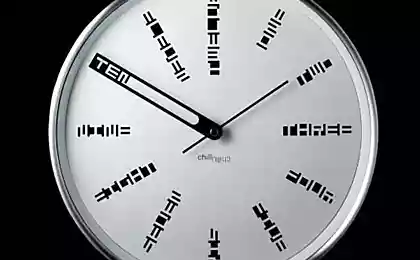612
Christmas: why we celebrate it not as all the people
Christmas, besides the Christmas tree, as well as the increasingly popular Christmas divination, for most Russians associate with the calendar problem.
It looks approximately so: we're like people!
And the Western Christmas, with turkeys, fireworks and skiing, we had to oppose something! Nothing better not figured out how to move the party for two weeks, so that the European "Christmas vacation" got to the post...

The reality is not so simple: the difference between Christmas for Orthodox and other denominations is the difference between "very old", Julian calendar and is also pretty old "new" Gregorian. One human life is incident almost imperceptible divergence dates once in a hundred years a leap year according to the Julian calendar may be not leap in Gregorian, but in the historical scale of the gap is significant: to the XXI century it is already 13 days.
The Gregorian calendar corresponds better to the movement of the Earth around the Sun, and thus the seasonal temperature changes, the change of seasons. The old style gradually "moves" through 8 thousand years of Christmas by the old calendar will be spring, and after 20 thousand — in the summer (like now in Australia!). Christmas in summer... wonderful, of course, but the prospect is not particularly frightening — even futurists do not plan the future more than 100 years.
(For those who love the calculations: for the year, i.e. during the circulation of the Earth around the Sun, the earth revolves around its axis approximately 365,24219 times, that is, is 365,24219... day.
But the calendar can only be an integer number of days. Therefore decided to divide the years into simple (365 days) and leap (366 days).
Leap coming with such frequency, on average, to give the desired 365,24219 day.
In the Julian calendar the leap years — every fourth, in Gregorian rule more difficult: leap year — every fourth year, except those years that are divisible by 100 but not divisible by 400.
Thus, in Gregorian calendar, year 2008 is a leap year, because 2008 is divisible by 4, 1900 — not a leap year, since 1900 is not divisible by 400.
But the astronomical accuracy in the choice of calendar is not important. Calendars and calendar reform from the beginning was perceived in a religious context.
"New style" was discussed in 1563 at the Council of Trent, the reformation Cathedral of the Western Church finally defined its "catholicnet". The requirement to use the new calendar was promulgated in 1582, Pope Gregory XIII; in honor of him called the Gregorian calendar. Dad offered to all Christian sovereigns to support his innovation.
The basic meaning of the changes in the sixteenth century saw a more correct calculation of date of Easter: according to the ancient canons it is the first Sunday after the first full moon after the vernal equinox.
Technically non-trivial way of calculating the date of Easter depend from length of day and the phase of the moon, from the first centuries led to confusion and disputes. Minor differences when the moon's position and Sun gave completely different dates, what was perceived as very painful in one area yet there was a Great post, and in the next has already finished the Easter fun...
And now it turns out that this is the date of the equinox (March 21) is not accurate!
Exit dad and his scientific advisers was to eliminate the accumulated offset of the calendar and return to the state of Affairs at the time of the first OEcumenical Council (325), when it approved the modern paschalia. To adjust accumulated since the time of "shift" is immediately added 10 days, so in 1582, after 4 October was followed by 15th.
The ease with which Catholics undertook the correction of the time counting, it is in the spirit of the era: the reformation forced the Catholic hierarchs to think about the ordering of Church life. Not casually criticism of Luther met such sympathy! Faulty calendar no surprise — if the service has accumulated so many violations, then the account may be compromised.
Society calendar was perceived as the idea of papal — Protestant countries adopted it only in the XVIII century, and the Orthodox in the late XIX — early XX century, the transition to the "Catholic" calendar looked almost apostasy.
But in the XXI century. The Gregorian calendar today— it's just generally accepted civil calendar, what was the Julian calendar during the Roman Empire.
Why, to this day, Orthodox stubbornly calculate the dates of the holidays calendar in honor of Julius Caesar?
Insurmountable obstacles for the introduction of a new style does not exist: Greeks serve according to the civil calendar and do not cease to be Orthodox. Some Russian parishes in Western Europe are the new style, however, not one to ignore the ruling Bishop has to celebrate the holidays twice.
But most of the Orthodox still live "the old way", and there's a good reason. To understand it you must ponder the meaning of time measurement in General. All days are the same, no one stands out in the overall sequence.
The calendar announces special some of them — holidays, boundary days, paints them with specific colors, gives special names. Those days, like lighthouses or roadside poles, their time is measured and conceptualized.
Different calendars are different and the meanings they give time. For example, now the usual method of measuring weeks: from Sunday to Sunday is not just a seven — day period, and not even just the reminder that Sunday is good to go to Church, week carries deep theological meaning of the Resurrection, which all starts and ends.
Clearly the desire of the Communists-godless to enter, instead of seven-day weeks to five — day. It is also understood the desire of non-Christians count years from the birth of Christ but from "our era".
The new style was introduced into Russia by the Soviet power, the Orthodox deliberately left in the old calendar, in a parallel time, not wanting to subject their time to non-Christian state. A new calendar for us this March 8, February 23, Lenin's birthday, may 1...
Old is the usual calendar, the posts, the ecclesiastical new year, but the main thing — freedom from compulsory ideology: the count on March 8, old style hardly come to mind.

And today the old style remains evidence of the separation of Church and state.
God forbid that the Department that was the Department in a positive sense to the independence of the Church helped to preserve their cultural values.published
Author: Nikolay Deev
Source: www.pravmir.ru/rozhdestvo-pochemu-my-prazdnuem-ego-ne-kak-vse-lyudi/
It looks approximately so: we're like people!
And the Western Christmas, with turkeys, fireworks and skiing, we had to oppose something! Nothing better not figured out how to move the party for two weeks, so that the European "Christmas vacation" got to the post...

The reality is not so simple: the difference between Christmas for Orthodox and other denominations is the difference between "very old", Julian calendar and is also pretty old "new" Gregorian. One human life is incident almost imperceptible divergence dates once in a hundred years a leap year according to the Julian calendar may be not leap in Gregorian, but in the historical scale of the gap is significant: to the XXI century it is already 13 days.
The Gregorian calendar corresponds better to the movement of the Earth around the Sun, and thus the seasonal temperature changes, the change of seasons. The old style gradually "moves" through 8 thousand years of Christmas by the old calendar will be spring, and after 20 thousand — in the summer (like now in Australia!). Christmas in summer... wonderful, of course, but the prospect is not particularly frightening — even futurists do not plan the future more than 100 years.
(For those who love the calculations: for the year, i.e. during the circulation of the Earth around the Sun, the earth revolves around its axis approximately 365,24219 times, that is, is 365,24219... day.
But the calendar can only be an integer number of days. Therefore decided to divide the years into simple (365 days) and leap (366 days).
Leap coming with such frequency, on average, to give the desired 365,24219 day.
In the Julian calendar the leap years — every fourth, in Gregorian rule more difficult: leap year — every fourth year, except those years that are divisible by 100 but not divisible by 400.
Thus, in Gregorian calendar, year 2008 is a leap year, because 2008 is divisible by 4, 1900 — not a leap year, since 1900 is not divisible by 400.
But the astronomical accuracy in the choice of calendar is not important. Calendars and calendar reform from the beginning was perceived in a religious context.
"New style" was discussed in 1563 at the Council of Trent, the reformation Cathedral of the Western Church finally defined its "catholicnet". The requirement to use the new calendar was promulgated in 1582, Pope Gregory XIII; in honor of him called the Gregorian calendar. Dad offered to all Christian sovereigns to support his innovation.
The basic meaning of the changes in the sixteenth century saw a more correct calculation of date of Easter: according to the ancient canons it is the first Sunday after the first full moon after the vernal equinox.
Technically non-trivial way of calculating the date of Easter depend from length of day and the phase of the moon, from the first centuries led to confusion and disputes. Minor differences when the moon's position and Sun gave completely different dates, what was perceived as very painful in one area yet there was a Great post, and in the next has already finished the Easter fun...
And now it turns out that this is the date of the equinox (March 21) is not accurate!
Exit dad and his scientific advisers was to eliminate the accumulated offset of the calendar and return to the state of Affairs at the time of the first OEcumenical Council (325), when it approved the modern paschalia. To adjust accumulated since the time of "shift" is immediately added 10 days, so in 1582, after 4 October was followed by 15th.
The ease with which Catholics undertook the correction of the time counting, it is in the spirit of the era: the reformation forced the Catholic hierarchs to think about the ordering of Church life. Not casually criticism of Luther met such sympathy! Faulty calendar no surprise — if the service has accumulated so many violations, then the account may be compromised.
Society calendar was perceived as the idea of papal — Protestant countries adopted it only in the XVIII century, and the Orthodox in the late XIX — early XX century, the transition to the "Catholic" calendar looked almost apostasy.
But in the XXI century. The Gregorian calendar today— it's just generally accepted civil calendar, what was the Julian calendar during the Roman Empire.
Why, to this day, Orthodox stubbornly calculate the dates of the holidays calendar in honor of Julius Caesar?
Insurmountable obstacles for the introduction of a new style does not exist: Greeks serve according to the civil calendar and do not cease to be Orthodox. Some Russian parishes in Western Europe are the new style, however, not one to ignore the ruling Bishop has to celebrate the holidays twice.
But most of the Orthodox still live "the old way", and there's a good reason. To understand it you must ponder the meaning of time measurement in General. All days are the same, no one stands out in the overall sequence.
The calendar announces special some of them — holidays, boundary days, paints them with specific colors, gives special names. Those days, like lighthouses or roadside poles, their time is measured and conceptualized.
Different calendars are different and the meanings they give time. For example, now the usual method of measuring weeks: from Sunday to Sunday is not just a seven — day period, and not even just the reminder that Sunday is good to go to Church, week carries deep theological meaning of the Resurrection, which all starts and ends.
Clearly the desire of the Communists-godless to enter, instead of seven-day weeks to five — day. It is also understood the desire of non-Christians count years from the birth of Christ but from "our era".
The new style was introduced into Russia by the Soviet power, the Orthodox deliberately left in the old calendar, in a parallel time, not wanting to subject their time to non-Christian state. A new calendar for us this March 8, February 23, Lenin's birthday, may 1...
Old is the usual calendar, the posts, the ecclesiastical new year, but the main thing — freedom from compulsory ideology: the count on March 8, old style hardly come to mind.

And today the old style remains evidence of the separation of Church and state.
God forbid that the Department that was the Department in a positive sense to the independence of the Church helped to preserve their cultural values.published
Author: Nikolay Deev
Source: www.pravmir.ru/rozhdestvo-pochemu-my-prazdnuem-ego-ne-kak-vse-lyudi/
NASA launched a scientific balloon new generation
Elder paisios of the Holy mountain: No need to justify your passion


